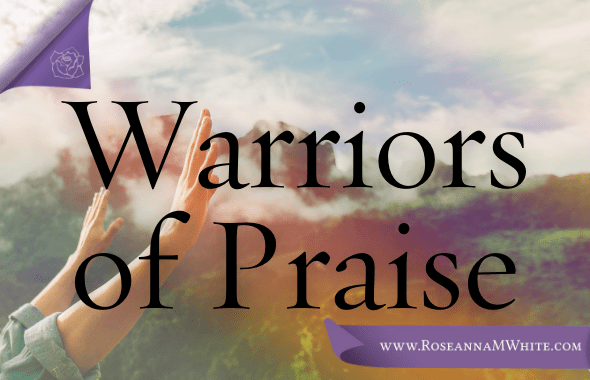
Warriors of Praise

In II Chronicles 20, we get the story of Jehoshephat, one of the godly, faithful kings of Judah. He was a good king. He loved the Lord and sought Him in all things. But enemies were coming against them, a vast army made up of three kingdoms united for the purpose of destroying them.
Jehoshephat sought the Lord. He called the entire nation of Judah to come together for prayer and fasting. So the whole nation assembled. They prayed. They humbled themselves. They listened to the prophet, listened for and to the word of the Lord. Then came something that really struck me.
So they rose early in the morning and went out into the Wilderness of Tekoa; and as they went out, Jehoshaphat stood and said, “Hear me, O Judah and you inhabitants of Jerusalem: Believe in the Lord your God, and you shall be established; believe His prophets, and you shall prosper.” 21 And when he had consulted with the people, he appointed those who should sing to the Lord, and who should praise the beauty of holiness, as they went out before the army and were saying:
“Praise the Lord,
For His mercy endures forever.”22 Now when they began to sing and to praise, the Lord set ambushes against the people of Ammon, Moab, and Mount Seir, who had come against Judah; and they were defeated. 23 For the people of Ammon and Moab stood up against the inhabitants of Mount Seir to utterly kill and destroy them. And when they had made an end of the inhabitants of Seir, they helped to destroy one another.
Wow. Right? I mean, first of all, what leader–military or otherwise–of a nation do you know who not only calls the people to prayer, but who considers the first act of defense to be to assign people to praising God? What commander sends a worship team out before the army? I don’t recall any other stories offhand in the Bible where this was the order of events, and I certainly don’t recall anything in modern history quite like this. But it’s profound, isn’t it?
Look at what happens when praise leads the way! Look at how the Lord clears the path when we remember Him first, when we give Him glory in the direst of circumstances, when we fill the battlefields in our lives with songs of His mercy and might.
Those battlefields are cleared.
It certainly isn’t a magical formula. They couldn’t just assign singers and expect victory. First the people had to come together and seek God. They had to cleanse their hearts before Him. They had to listen to His word. They had to obey. They had to act in unity, following His instruction.
And when they did that, when they stepped out in perfect faith, trusting that God would deliver their enemies without them even having to fight, as the prophet promised them in verse 17 of that same chapter…when they did that, God moved in a powerful way. And He did it when their praises rang out. When they began to sing and to praise…
What happens when WE begin to sing and praise–not just because it’s the time of the service that calls for it, but in those moments when we know the greatest fear? When the enemy is surrounding us? What happens when we praise Him in our darkest moments?
What must it have been like to be one of the musicians and singers appointed for this honor? Looking at verse 21, the king consulted with the people and then chose them. I daresay he didn’t choose the greatest warriors. I don’t honestly know if he chose those with the prettiest singing voices. He chose those who WOULD sing to the Lord and praise the beauty of holiness. These were the people who led the army. Not the generals. Not the strong men. Those with hearts of praise. Those who knew the beauty of holiness, so that they could sing about it.
Oh Lord, shape my heart to be one of those people. Shape me to be so amazed and swept away by the glory of your holy name, of your perfect nature, that my first response is song. Is praise. Shape me to be the sort of person who leads the way not with weapons or strength of arm, but with my dedication to you. Shape me into a warrior of praise.
Shape me, Lord, so that then, when I lift my voice to you, I can see you at work. Because you are the mighty one who clears the battlefields for us. You are the one whose righteousness paves the way. You are the one who delivers us from all our trouble…as long as first we seek you. Humble ourselves. Cling tight to your promises.
And let praise lead us forward.














 Roseanna M. White is a bestselling, Christy Award winning author who has long claimed that words are the air she breathes. When not writing fiction, she’s homeschooling her two kids, editing, designing book covers, and pretending her house will clean itself. Roseanna is the author of a slew of historical novels that span several continents and thousands of years. Spies and war and mayhem always seem to find their way into her books…to offset her real life, which is blessedly ordinary.
Roseanna M. White is a bestselling, Christy Award winning author who has long claimed that words are the air she breathes. When not writing fiction, she’s homeschooling her two kids, editing, designing book covers, and pretending her house will clean itself. Roseanna is the author of a slew of historical novels that span several continents and thousands of years. Spies and war and mayhem always seem to find their way into her books…to offset her real life, which is blessedly ordinary.